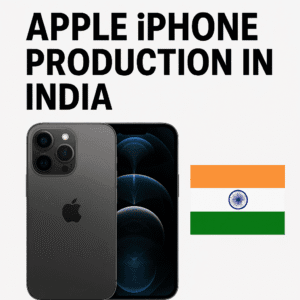Apple iPhone Production in India: 5 Shocking Reasons Why Trump’s Demand to Reshore Could Backfire Big Time!
Former U.S. President Donald Trump, now back in office, has demanded Apple halt iPhone manufacturing in India and shift production to the U.S., citing his “America First” policy. However, Apple has resisted, reaffirming its commitment to India, where it produces 40 million iPhones annually (15% of its global output). While Trump insists iPhones sold in America should be made domestically, Apple sees India as a critical hub due to lower costs, skilled labor, and incentives under India’s PLI scheme.
Foxconn and Tata Electronics are expanding facilities in Tamil Nadu and Telangana, further solidifying India’s role in Apple’s supply chain. Trump’s push highlights tensions between political reshoring efforts and corporate globalization strategies. Apple’s reluctance stems from higher U.S. production costs and the need to diversify beyond China. The standoff raises questions about potential tariffs, U.S. manufacturing feasibility, and India’s growing influence in tech manufacturing. For now, Apple appears unwilling to compromise its India operations, setting the stage for a prolonged economic and political debate.

Apple iPhone Production in India: 5 Shocking Reasons Why Trump’s Demand to Reshore Could Backfire Big Time!
In a bold move highlighting his “America First” agenda, former US President Donald Trump, now back in office, has publicly pressured Apple CEO Tim Cook to halt iPhone production in India and shift manufacturing back to the United States. Speaking in Doha, Trump claimed he told Cook, “I don’t want you building in India if you want to take care of India.”
However, Apple appears unwilling to comply fully with Trump’s demands. Despite his push for domestic production, the tech giant has reassured Indian officials that its expansion plans in the country remain unchanged.
Why India Matters to Apple
Currently, China dominates iPhone production, but India has emerged as a crucial secondary hub, assembling around 40 million iPhones annually—roughly 15% of Apple’s total output. Key suppliers like Foxconn and Tata Electronics have ramped up operations in Tamil Nadu and Telangana, with new facilities underway to further boost production.
Apple’s commitment to India isn’t just about cost savings—it’s strategic. The country offers:
- Lower labor costs compared to the US
- A growing consumer market for premium devices
- Government incentives under India’s Production-Linked Incentive (PLI) scheme
- Diversification away from China amid geopolitical tensions
Trump’s Ultimatum: Make iPhones in the US or Only for India
Trump’s stance is clear: he wants iPhones sold in America to be made in America. While he conceded that Apple could continue producing devices in India for the local market, he insisted that exports to the US should stop.
This puts Apple in a tough spot. The company has already begun shifting some production out of China due to trade wars and supply chain risks, but US manufacturing remains expensive and logistically challenging. Labor costs, infrastructure, and component supply chains are far more competitive in Asia.
Apple’s Balancing Act
Despite Trump’s pressure, Apple seems determined to maintain its Indian operations. Sources indicate that executives have privately assured Indian officials that India will remain a key manufacturing base, with plans to expand further.
Cook has previously emphasized India’s importance, noting that iPhones made in India will soon account for most US sales in certain quarters. Additionally, Foxconn has started producing AirPods in Telangana, signaling deeper investment in India’s electronics ecosystem.
What’s Next?
- Will Trump impose tariffs or restrictions on India-made iPhones?
- Can Apple afford to shift significant production to the US without raising prices?
- Will India sweeten the deal with more incentives to keep Apple invested?
For now, Apple isn’t backing down—but the tug-of-war between corporate strategy and political pressure is far from over.
Final Thought
Trump’s push for reshoring reflects a broader debate on globalization versus self-reliance. Yet, for Apple, business realities—cost, scalability, and market access—may outweigh political demands. India, with its skilled workforce and incentives, remains too valuable to abandon. The question is: Can Trump force a change, or will Apple’s supply chain stay global?
You must be logged in to post a comment.